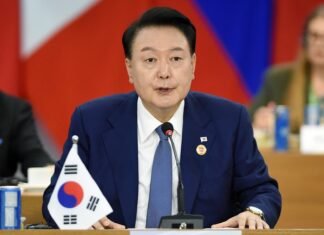Donald Trump has recently made headlines by expressing his views on Ukraine’s potential membership in NATO. During a discussion, he stated that the idea of Ukraine joining the North Atlantic Treaty Organization should be put aside, asserting that this aspiration was likely a significant factor that led to the escalation of tensions and the conflict currently affecting the region.
In his remarks, Trump emphasized the complexities surrounding NATO’s expansion, particularly in relation to Ukraine, a nation that has been at the center of geopolitical disputes. He suggested that the notion of Ukraine joining NATO may have contributed to the ongoing crisis, implying that such a move could have inflamed the already delicate situation between Russia and Ukraine.
Furthermore, Trump confirmed the upcoming visit of Ukrainian President Volodymyr Zelensky to the United States, scheduled for Friday. This visit signifies the continued dialogue between Ukraine and the U.S., especially in the context of military support, economic aid, and diplomatic relations. Zelensky’s trip aims to strengthen ties and seek further assistance from one of Ukraine’s key allies, especially during this pivotal time of conflict with Russia.
The conversations around NATO and Ukraine are not new; they date back several years and have intensified since the onset of the conflict in 2014. After Russia’s annexation of Crimea, Ukraine’s NATO aspirations became a focal point of international relations. While various NATO members have expressed support for Ukraine, the formal invitation for membership has remained a contentious issue.
Many in the international community see Ukraine’s membership in NATO as crucial for bolstering the nation’s defense capabilities against potential aggression. However, others warn that such a move could provoke further tensions with Russia. The geopolitical landscape is complex, with varying opinions on the best approach to ensure stability and peace in Eastern Europe.
In light of Trump’s assertions, it is evident that perspectives on NATO’s role and Ukraine’s future within the alliance are diverging. His stance may resonate with certain segments of the U.S. political spectrum, emphasizing a more isolationist approach to foreign policy. On the other hand, advocates for Ukraine’s NATO membership argue that it would provide the necessary security guarantees to deter any future aggression from Russia.
As Zelensky prepares for his visit, the discussions will likely center on critical issues such as military aid, economic support, and reinforcing the partnership between Ukraine and the U.S. The outcome of these talks could significantly influence both Ukraine’s defense strategy and its aspirations for NATO membership.
The dynamic situation in Eastern Europe requires close monitoring, as the implications of these discussions extend beyond the immediate concerns of Ukraine and Russia. The international community is watching closely, as the decisions made in the coming days could potentially reshape the geopolitical landscape and impact relations between NATO and Russia in the years ahead.
In conclusion, Trump’s exclusion of Ukraine’s NATO membership presents a significant point of contention in ongoing discussions about national security and international alliances. As Zelensky heads to the U.S., all eyes remain on how these high-level discussions will unfold and what they will mean for Ukraine’s future position within the global arena.






